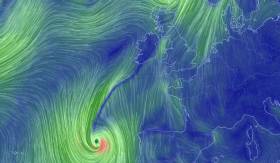Displaying items by tag: Storm Ophelia
#navalvisits- A Royal Canadian Navy frigate HMCS Montréal made a morning arrival to Dublin Port yesterday having taken part in a major UK led exercise involving a large NATO fleet off Scotland last week, writes Jehan Ashmore.
The call of the 1994 'Halifax' class frigate follows Friday's visit to Ireland of Canada’s Minister of Environment and Climate Change, Catherine McKenna, to the Marine Institute headquarters in Oranmore, Co. Galway. Among the topics the minister discussed was climate change and collaborations under the Atlantic Ocean Research Alliance.
Only days later, due to the severity of Storm Ophelia, the Marine Institute decided to close the headquarters as the Red weather status storm swept across the country.
In advance of Ophelia and the Irish call, HMCS Montréal completed the exercise off Scotland and visited Glasgow from where also the Spanish frigate Álvaro de Bazán paid a call.
As Afloat previously reported, foreign naval calls to Irish ports can be very fluid including cancellation due to 'operational reasons' and this may apply to the frigate. An Italian Navy frigate however may instead be the next visitor on the Dublin Bay horizon, in the form of the FREMM class frigate ITS Luigi Rizzo.
Returning to the HMCS Montréal, the 134m Halifax class frigate role is for multi-role operations in that they are anti-submarine/aircraft and ship. Among the weapons systems are Sea-Sparrow SAM missiles. The 5,000 tonnes deep load frigate built by Canadian yard St. John Shipbuilding was commissioned into service in 1994 and has a crew complment of 225 that includes an air-wing.
Prior to the arrival of the Canadian visitor, the Irish Naval Service OPV90 class L.E. James Joyce was already docked in Dublin having sailed from Killybegs. During storm Ophelia,the OPV remained berthed at the Deepwater Quay along the south quays. This berth allocation for the Irish Navy is a first in terms of reporting on Afloat and previously other marine media.
It was within an hour's arrival of HMCS Montréal that the second of the OPV90 class sisters shifted berths in Dublin which involved L.E. James Joyce pass the visiting naval frigate. The move of berths led to the Naval Service vessel make a transit through the Tom Clarke toll-lift bridge to an upriver berth alongside Sir John Rogersons Quay.
Minister Creed Urges Extra Vigilance As Storm Ophelia Approaches
The Minister for Agriculture, Food and the Marine Michael Creed T.D. this evening urged farmers, fishermen and people in rural areas to be extra vigilant and take precautions as Storm Ophelia approaches the Country. The Minister was speaking after the Committee on Emergency Planning meeting this morning at which his Department was represented.
Commenting the Minister said:
"I urge farmers and all people in rural areas to ensure that they are ready for the approaching storm and ask them to follow closely the advice of the authorities particularly for those in the worst affected Counties. Priority is obviously the safety of people and I would reiterate the advice that only essential travel should be taken. For farmers they should ensure that their yards are secured by securing loose objects".
The Minister also reminded landowners of the dangers of fallen trees in particular the impact this can have on electric wires. The assessment of damage in such circumstances should only be carried by appropriately trained professionals from the electricity companies. Shed doors should be securely fastened and older slat roofs sheds avoided. If you have to check on livestock, bring a family member or neighbour and in more exposed and remote areas, wait until the storm abates.
The Minister also asked people to check on elderly neighbours in rural areas and importantly avoid any risks. Fishermen should take particular care as the force of the storm will be felt most along the western coastline.
Concluding the Minister said
"My Department will continue to input to the Committee on Emergency Planning which is due to meet again in the morning. In the meantime officials from my Department and its Agencies will be on the ground monitoring closely the impacts of the storm around the Country and I will be receiving updates as it progresses".
Check out this website to see the storm approaching here





























































